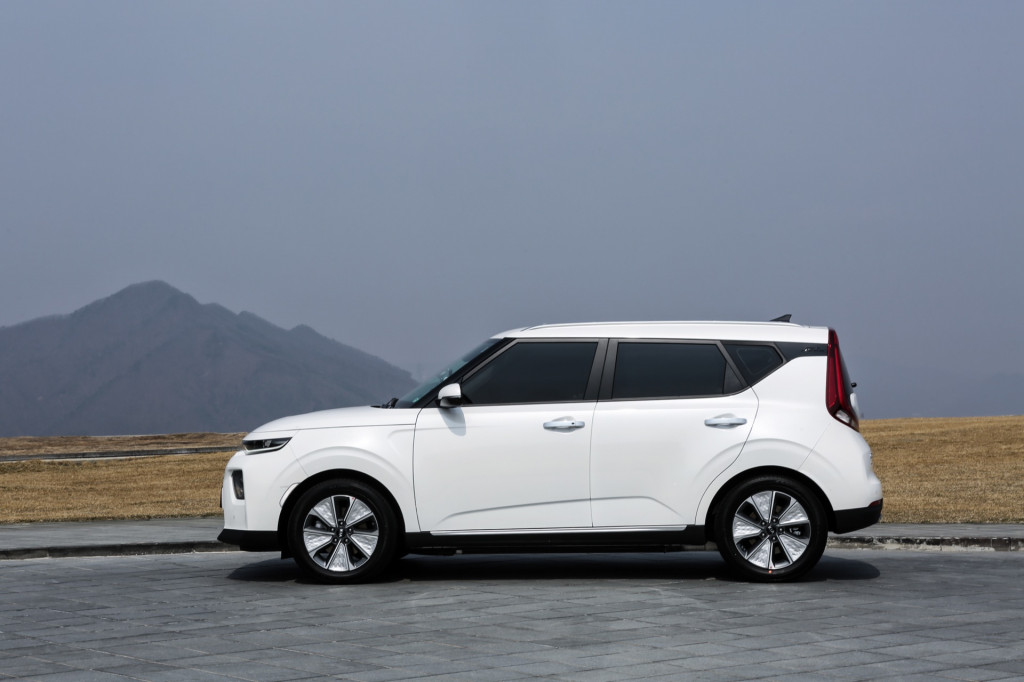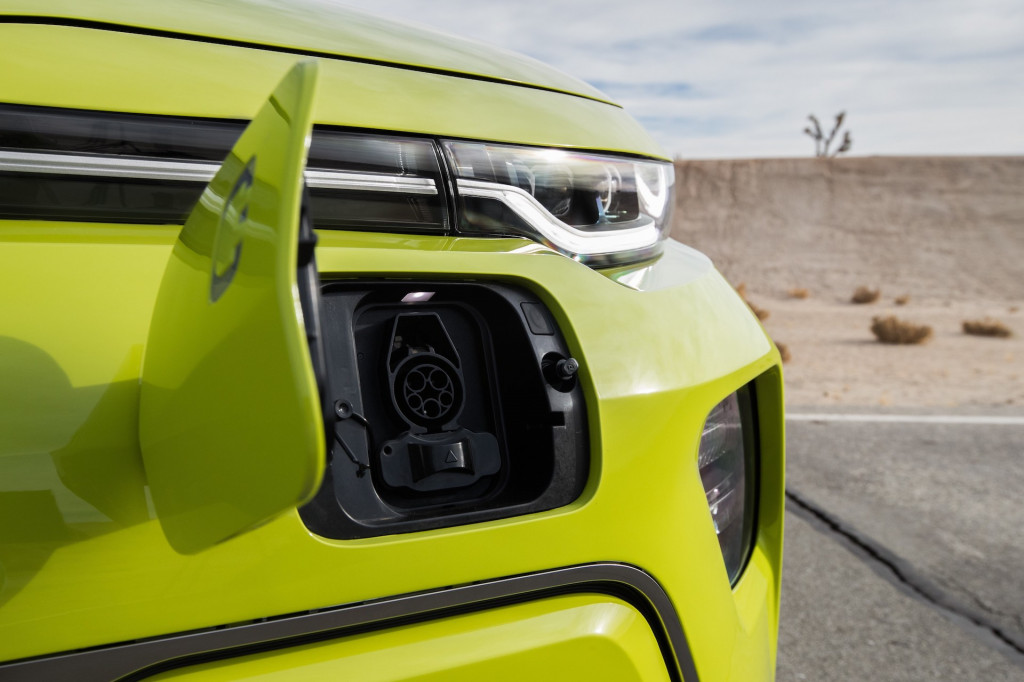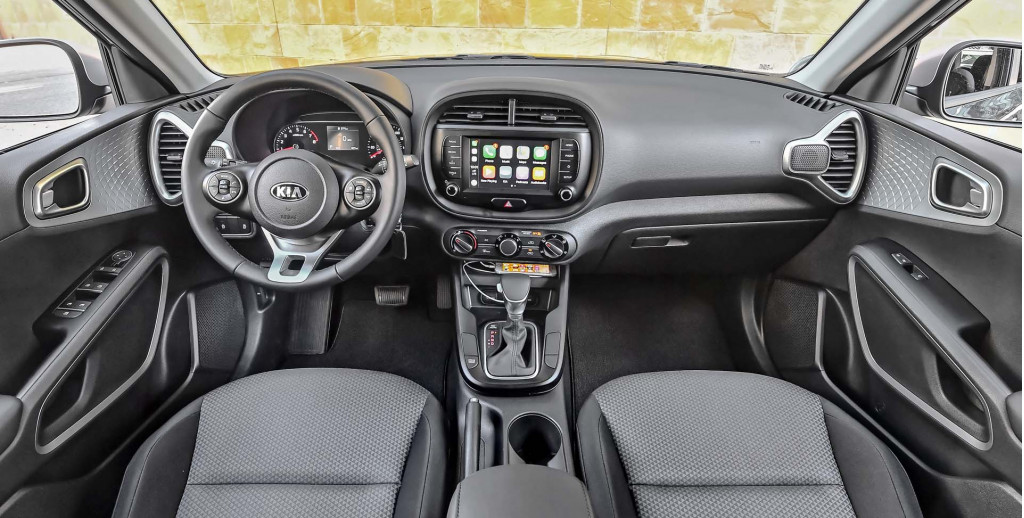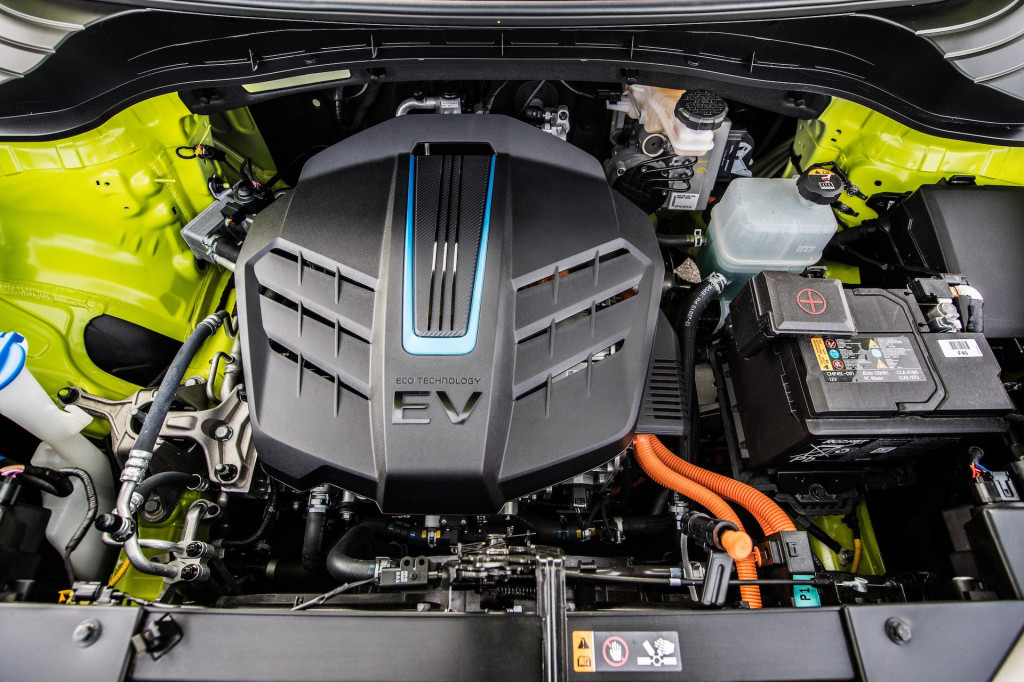I’m snaking the 2020 Kia Soul EV around a bend in the Korean countryside, happy to push faster after weathering Seoul’s famous morning traffic earlier, but I can’t escape two recurring thoughts. The first is that, if anything, real-time range estimates are conservative, or at the very least, nearer to the real world than ever before. The second is just how quick and almost unnecessarily dynamic this new car is.
The current Soul EV is to the U.S. a compliance car, sold and marketed only where it’s required due to clean-air laws. Whether the new 2020 Soul EV—internally codenamed SK3 EV—can break out of that corner remains to be seen. It sure feels like it, and it’s had a noticeable amount of work put into it with several key points worth noting.
First and foremost, the EPA-rated range is pegged at 243 miles, which bests the Chevy Bolt by a handful, and more importantly, makes dramatic progress on the first-gen (current) Soul EV’s 111-mile range. While the current Soul EV uses a 30-kwh air-cooled battery, the new one counts on a 64-kwh liquid-cooled pack.
The SK Innovation-sourced packs Kia used in the Niro EV and Soul EV have five modules of pouch cells, with three oriented lengthwise under the passenger floor, and two stacked crosswise under the rear seat area. The new setup is more efficient too, with a 114 MPGe rating in the 2020 Soul EV versus the 108 MPGe figure in the previous Soul EV.
DON\’T MISS: 2020 Kia Soul EV rated for 243 miles, improved efficiency
The first-gen Soul EV was loved for its quirky styling, ergonomics allowed by its boxy physique, and for its spunky design charm. But its performance was underwhelming, which has been addressed in a major way. The 0-60 mph time leaps from 11.2 seconds on the current car to 7.2 seconds, for starters.

2020 Kia Soul EV
Of course, that speed doesn’t just come from anywhere, the 2020 model cranks up the power and torque in a profound way. The current Soul EV’s relatively anemic 109 horsepower and 210 pound-feet of torque blasts up to 201 hp and 291 pound-feet. Several times we stopped completely, and then floored the accelerator pedal only to be greeted with tire screeching as we propelled ahead, the traction systems fine with letting us effectively peel out.
That was in Normal mode; the 2020 model has four drive modes to operate in, Eco, Eco+, Normal, and Sport.
Eco mode is best during periods of heavier, slow-moving traffic. It softens the accelerator’s response and limits the climate control to the driver only. Eco+ is useful to squeeze every mile of range. In this mode, the climate control is disabled, and regen is maximized. Kia’s engineers say Eco+ is a last situational resort, but we can see misers appreciating it even when not needed.
CHECK OUT: 2019 Kia Soul EV drops most affordable trim
The Soul EV can handle twisty roads well and the car is markedly more capable than the one it replaces. Its steering is predictable, with an agile feel and minimal lean when pitched hard into low-speed corners.

2020 Kia Soul EV first drive – South Korea – April 2019
From the driver’s seat, you’ll hear a distinct motor whine when accelerating that quickly dims to white noise when driving. There’s a little tire and road noise, but not much. Overall the ride is pretty quiet.
We took the Soul EV for a couple of laps around Kia’s high-speed test track at Namyang. At higher speeds you’ll hear all of the noises heighten, the road and motor noise ramp up, the cabin almost becomes a raucous environment, until your foot comes down hard on the brakes and the deceleration-whine and speed-scrubbing whoosh become the sound that overtakes the cabin.
The 2020 Kia Soul has four modes of regenerative braking, from zero to 3, as in other Hyundai and Kia products, and they can be controlled via the paddle shifters. The “zero” mode means there is no regeneration, and the feel is most similar to driving a gasoline-powered, traditional ICE car, while 3 features the most regeneration.
READ MORE: Here’s why Kia Soul EV and Kia Niro EV both get big 64-kwh battery packs
If you hold the left paddle, the regeneration is stronger and can gently stop the car completely. The strongest regen mode allows for one-pedal driving, like e-Pedal on the Nissan Leaf, and we found it to work well with the flow of traffic, without having to dab back and forth between the accelerator and brake pedals.

2020 Kia Soul EV
When you want to charge, the new car gets 100-kilowatt CCS DC fast-charging, like the Soul EV’s electric sibling, the Niro EV. That’s significantly faster than the Bolt’s 50-kw charging, and Kia’s engineers say the battery will charge to 80-percent charge in just 54 minutes. A 20-percent to 80-percent charge (because you’ll rarely be charging from zero battery) is about 45 minutes. On Level 2, you can expect about 9 hours and 35 minutes to achieve a 100-percent charge.
You can even plug it into a traditional 120-volt AC household outlet if you somehow find yourself in a situation without another option, but at 63 hours to achieve a full charge, that’s a last resort.
Just like the new non-electric Soul, the Soul EV will offer full-range adaptive cruise control, a blind-spot-monitoring system, pedestrian detection, and automatic emergency braking. Kia’s active lane control keeps you centered in your lane and will steer into gentle turns, but for windier roads it’ll want you to resume control.
While there are some pieces that are unique to the EV—such as the front fascia and its plastic bumper instead of a large grille opening, plus unique LED headlights, fog lights, and taillights, and five-spoke 17-inch alloy wheels—the new Soul EV is clearly identifiable as a Soul on the road. It boasts a funky and distinct style like the first generation. The new car is more than 2 inches longer than the one it replaces, with a 1-inch longer wheelbase. The EV sits a negligible quarter-inch higher.

2020 Kia Soul
Inside, there are a few things you’ll notice as well beyond the regular Soul’s funky design language and mood lighting. For one, unlike the regular Soul, the Soul EV uses shift-by-wire, so a rotary knob handles shifting from park. The new 10.3-inch touchscreen also displays battery and charging info, and has its own version of the Kia UVO system. A smartphone app will give you real-time telematics data, and can tell you about the current status of your car, or keep track of trip info. You can also send navigation directions to your car remotely, or activate and set climate preconditioning remotely.
The 2020 Kia Soul EV is expected to arrive in dealerships later this year, likely late summer or fall (the 2019 Kia Niro EV is arriving this spring). The new second-generation Soul EV maintains a lot of the quirky personality that owners love, and boasts new technologies, dramatic improvements in performance, and range, making it one of the more alluring EV picks on-a-budget.

